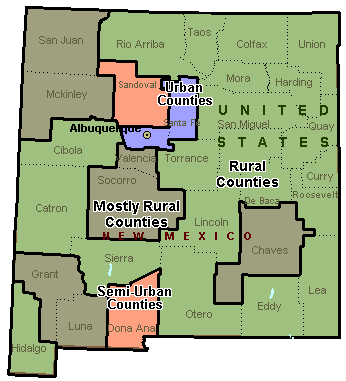![]()

Rural counties have agricultural or other factors that so overwhelm the influence of any villages or cities within them to the point where, for tax auction purposes, the entire county can be considered rural.
Mostly Rural counties are similar to Rural counties, except that they have at least one urban area that acts like a hub. While the county is clearly rural in nature, the urban area is large enough or significant enough to be noticed. Lots in these urban areas tend to be noticeably, though not significantly, more expensive, although this is often because the lots tend to be developed.
Semi-Urban counties have a large (at least for New Mexico) urban influence, where there is a clear division between urban and rural areas. Lots in these urban areas are often significantly more expensive than those in nearby rural areas, even when the lot has not been improved.
Urban counties, while not quite paved from border to border, clearly have urban influence which overwhelms rural concerns. Even lots in the rural areas of these counties tend to be more expensive than similar lots in more rural counties.
Q: What do I need in order to bid?
A: Money and a bidder's card.
Q: How do I get a bidder's card?
A: Go to an auction and register.
Q: How do I learn where the auctions are?
A: Visit this website, of course.
Q: How much do the properties go for?
A: It's an auction. They sell for the highest bid, of course.
Q: What happens if I decide I don't want it after all?
A: You're free to sell it.
Q: What if I don't want to buy it in the first place?
A: Then don't bid on it.
Q: I mean, what happens if I decide not to pay for it?
A: In the end, you will. In the meantime, you will be banned for life from future auctions. There is no provision in the rules for getting back into the state's good graces. Check out the property before you buy.
Q: How do I pay?
A: Cash is always good. Cashier's Check for the correct total (they don't give change). There was a rumor that credit cards would be accepted in some locations as a test, but it doesn't seem to have happened. They take a personal check so long as you also have a letter from your bank that states that the bank guarantees payment. A letter from the bank stating how much you have in the account is not acceptable.
Q: OK, I got some property. Now what do I do with it?
A: The answer to that depends on why you bought it. I'm not going to tell you everything for free. I strongly suggest you check out Deals and Duds: New Mexico Quiet Title Actions.
Q: That seems like a cheap plug to sell some books.
A: Cheap to you maybe. The books pay for the website. If you find the information here useful, buy a book. If you use the information you got here, then you obviously found it useful, eh?
Q: What kind of deed will I get?
A: They used to say Tax Deed, but now they just say Deed. They are the equivalent to a quit claim deed. The state absolutely does not guarantee any sort of title.
Q: Then how can I sell it?
A: The same way you can if you received a warranty deed, of course. You can sell it with a quit claim deed, a special warranty deed, or a warranty deed. Of course, if you sell it with a warranty deed, then you personally take full responsibility for the title, even if the problem occurred before you received it or even before the state received it. You won't be able to get title insurance, however, until you quiet the title.
Q: What does "quiet the title" mean?
A: That means you go to court and have a judge determine the state of the title. If nobody objects, or if the objections aren't upheld, then the property is entirely yours.
Q: What if an objection is upheld?
A: Then you get to work out a deal with whoever objected.
Q: Suppose I lose the property? How do I get my money back?
A: You don't. That's why you do your homework, including a title search, before you buy.
Q: Why should I put all that work into something I might not get?
A: You should invest the time to avoid future problems should you get the property, of course. You alone know how much risk you're willing to put up with. You pays your money and you takes your chances. The more money you're willing to spend on a property, the more you should research it. If you aren't going to spend more than a few hundred bucks and you can afford to lose it, don't worry about it. If you are willing to spend serious money, or you intend to build your dream home there, then take the time to eliminate problems. Carefully choose which properties to bid on so you minimize your risks.
Q: Fine. How do I "quiet the title"?
A: It just so happens that the answer to that question is available in book form. It's far too complicated to answer on a simple FAQ page.
Q: That's just another cheap plug.
A: What's your point?
Q: Suppose I manage to quiet the title. Now what can I do with the property?
A: Why did you buy it in the first place? Do whatever you had in mind when you bought it. After all, it's yours!
![]()
© 2006 Scott Hedrick
This page was last updated on 10/06/06 07:14:15 PM